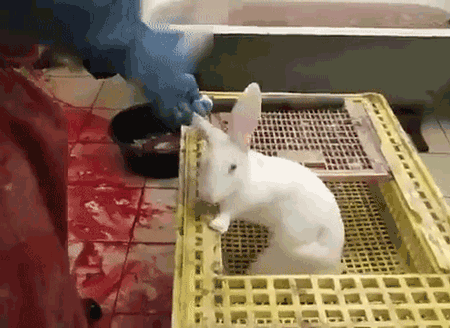|
Dear Friend, A terrified rabbit thrashes wildly as a worker grabs her ears and roughly yanks her from a crate. The worker brandishes a metal pipe and begins to bash the rabbit on the head repeatedly in a crude attempt to knock her unconscious. Then, he hangs her twitching body upside down alongside other rabbits. He begins hacking off their heads, spattering blood across the filthy floor of the killing room. The whole grisly scene takes place in full view of other frightened rabbits, who can do nothing but wait, their hearts pounding, until it's their turn to be beheaded. A horrifying PETA Asia investigation reveals that cruelty and immense animal suffering remain the norm on fur farms. Please take immediate action against the fur trade and other cruel industries by making a donation of at least $3 to PETA today.  A PETA Asia investigator who visited Russian fur farms found horrors at every turn:
The facilities where these and hundreds of other animals suffered are believed to have ties to global auction houses. But regardless of where it's sold or by whom, all fur is the product of violence. While the industry may be on its last legs—thanks in no small part to the actions and generosity of passionate PETA supporters like you—investigations like this one reveal the extent of the pain and suffering that so many animals still endure for clothing. After decades of exposés and determined campaigning by PETA, the majority of the fashion world is going fur-free. We're pushing designers and retailers like Chanel, Prada, and Macy's to shed animal skins in favor of stylish, sustainable, and compassionate vegan materials, and today countless consumers are embracing clothing made without causing animals to suffer. But as this latest exposé shows, we can't forget about the rabbits, minks, and other animals who still need someone to end their misery—and this means that today, we need YOU so that we can help them. Thank you for your compassion and generosity. Kind regards, |
||||
|
This e-mail was sent to [email protected]. Please let us know if you'd prefer that we use a different e-mail address. Want to get more active for animals? Sign up to receive additional updates about PETA's work through our subscription page. You can also choose to receive fewer e-mails or unsubscribe if you're absolutely certain that you want to become less involved in our work for animals. This e-mail was sent by PETA, 501 Front St., Norfolk, VA 23510 USA. |
||||
